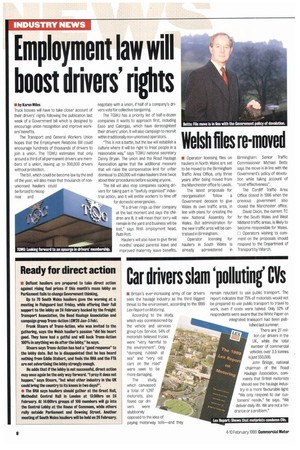Employment law will boost drivers' ri ts
Page 10

If you've noticed an error in this article please click here to report it so we can fix it.
• by Karen Miles Truck bosses will have to take closer account of their drivers' rights following the publication last week of a Government bill which is designed to encourage union recognition and improve workers' benefits.
The Transport and General Workers Union hopes that the Employment Relations Bill could encourage hundreds of thousands of drivers to join a union. The TGWU estimates that only around a third of all permanent drivers are members of a union, leaving up to 300,000 drivers without protection.
The bill, which could be become law by the end of the year, will also mean that thousands of nonunionised hauliers could negotiate with a union, if half of a company's drivers vote for collective bargaining.
The TGWU has a priority list of half-a-dozen companies it wants to approach first, including Esso and Calorgas, which have derecognised their drivers' union. It will also campaign to recruit within traditionally non-unionised operators.
"This is not a battle, but the law will establish a culture where it will be right to treat people in a reasonable way," says TGWU national secretary Danny Bryan. The union and the Road Haulage Association agree that the additional measure that will raise the compensation limit for unfair dismissal to £50,000 will make hauliers think twice about their procedures before sacking anyone.
The bill will also stop companies sacking drivers for taking part in "lawfully organised" industrial action, and it will entitle workers to time off for domestic emergencies.
"If a driver rings up their company at the last moment and says the children are ill, it will mean their lorry will remain in the yard and business will be lost," says RHA employment head, Ruth Pott.
Hauliers will also have to give three months' unpaid parental leave and improved maternity leave benefits.








































































































